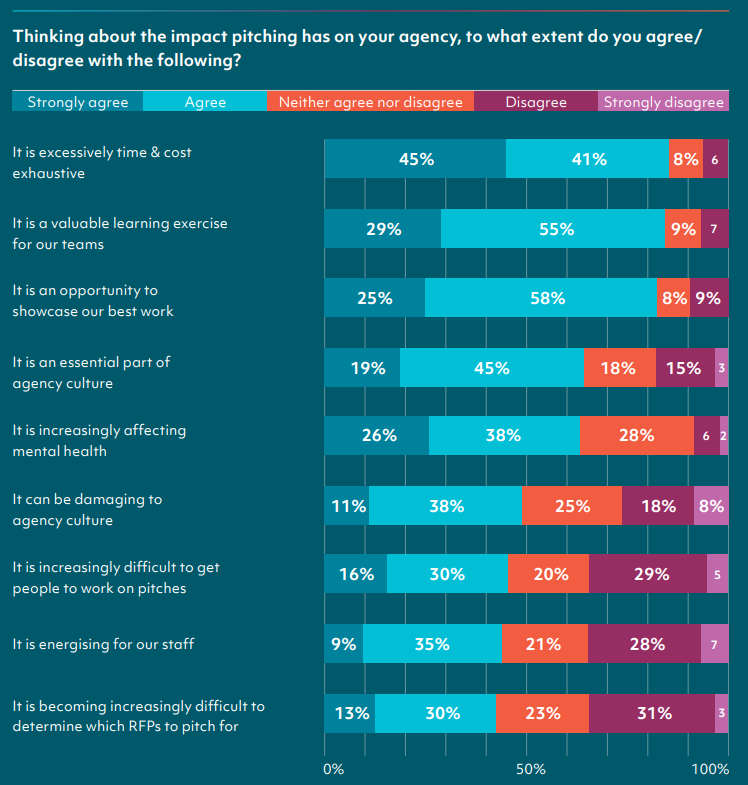Pitching now affects our mental health, agencies warn

More than half (54%) of media agency staffers say that pitching is increasingly affecting staff mental health.
According to the latest study from global media consultancy MediaSense, the increasingly intense standards for pitching, leading to long, high stress working hours, as well as frustration with current evaluation criteria and transparency from clients have been found to be behind such negative effects on mental health.
The report, titled Pitch Smart, found that the vast majority (86%) of agency respondents find pitching excessively time and cost exhaustive and that two-thirds (64%) find pitching damaging to agency culture.
The report comes following a pandemic-era period of unprecedented pitch activity and amid acute talent shortages across the industry.
Holdcos ‘most acutely’ affected
While respondents still found value in pitching as a crucial part of agency culture (64%), a valuable learning exercise (84%), and an opportunity to showcase their best work (83%), the human and financial impact of the process is causing strain. “The current approach is a drain on agency resources and wellbeing in a market with major talent shortages,” one respondent wrote.
The study found that holding company media agencies are feeling the negative effects of pitching “most acutely”. The findings read: “Current ways of working are also seen as unnecessarily time consuming and expensive. The need to mitigate this is already informing what pitches are chosen for participation – something that is increasingly impacting clients.”

Ryan Kangisser, managing partner, strategy at MediaSense and author of the Pitch Smart study, added: “While the pitch still remains a necessary vehicle for advertisers to source the right agency partner, this study reveals an overwhelming desire to evolve the process to one which is more streamlined, practical and transparent. While tempting to test everything, advertisers should focus on the capabilities and values that matter and design a process accordingly.”
‘Win-win’ reforms
The Pitch Smart report recommends a number of reforms that can be made, based on demand from respondents. For one, 94% of respondents said that the request for information (RFI) is an ineffective way of showcasing an agencies capabilities. Further, capability deep-dives, such as 24-hour planning briefs, were often seen as overly gruelling or an otherwise a poor measure of value, despite recognition that client requirements have become increasingly complex.
One respondent commented: “We had 50 people in the agency over the weekend to respond to their 24-hour planning brief. The reality is most of those people wouldn’t be working on the account if we won it.” Another pleaded: “Kill the 24-hour brief test and the media pricing tests – neither accomplish any true objective.”
A lack of transparency was also a key complaint, with agencies on average rating the level of transparency received from clients in terms of selection criteria in a pitch process at just 3.8/10. “Clients need to get better at articulating the reason they are pitching their business,” said one respondent. “Be transparent about the reason: cost cutting, strategic improvements, tech capabilities, etc. This is never really articulated well enough in 90% of pitches, and it would really help agencies make better decisions to pitch or not to pitch, and how to pitch.”
There is also a universal (100%) feeling that in-person chemistry meetings are needed between agencies and potential clients; a return to face-to-face meetings, rather than virtual meetings, would appear to be a boon for the whole process.
The study further revealed that key to improving the pitch process is rethinking current evaluation criteria. The study found “a clear disconnect” between the resources different evaluation criteria occupy in the pitch process and the perceived contribution they have in selecting a partner. In particular, agency staffers were found to have preferred to move away from decisions based mostly on commercial criteria and towards mutually sustainable criteria models.
The study reads: “While commercial elements will continue to play a role in agency selection, increased transparency around scoring will help to manage expectations, and ensure that correct weightings are given (and understood) for core and differentiating capabilities.”
Ongoing efforts
Last year, the IPA and ISBA launched the Pitch Positive Pledge, which is designed to make the pitch process more “intentional, accountable, and responsible for brands and agencies.”
Amid the launch in May 2022, Andrew Lowdon, then-director of agency services at ISBA, commented: “There were examples of poor pitching behaviours before the pandemic, but Covid has changed the way we all work. There is a lot of good practice deployed but maintaining and spreading it further is required as we seek to value individuals’ wellbeing, and recognise the importance of good mental health. The Pitch Positive Pledge doesn’t seek to change the process by which pitches are run, it seeks to make the process more intentional and operate with greater consistency through better planning, preparation, and project management.”
While Pitch Positive currently has over 298 signatories that have pledged to “enhance pitching in a bid to improve mental health, cause less wastage and reduce costs,” it is unclear if the pitch process has yet been substantially altered for the better.



